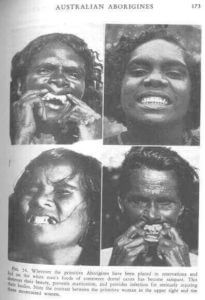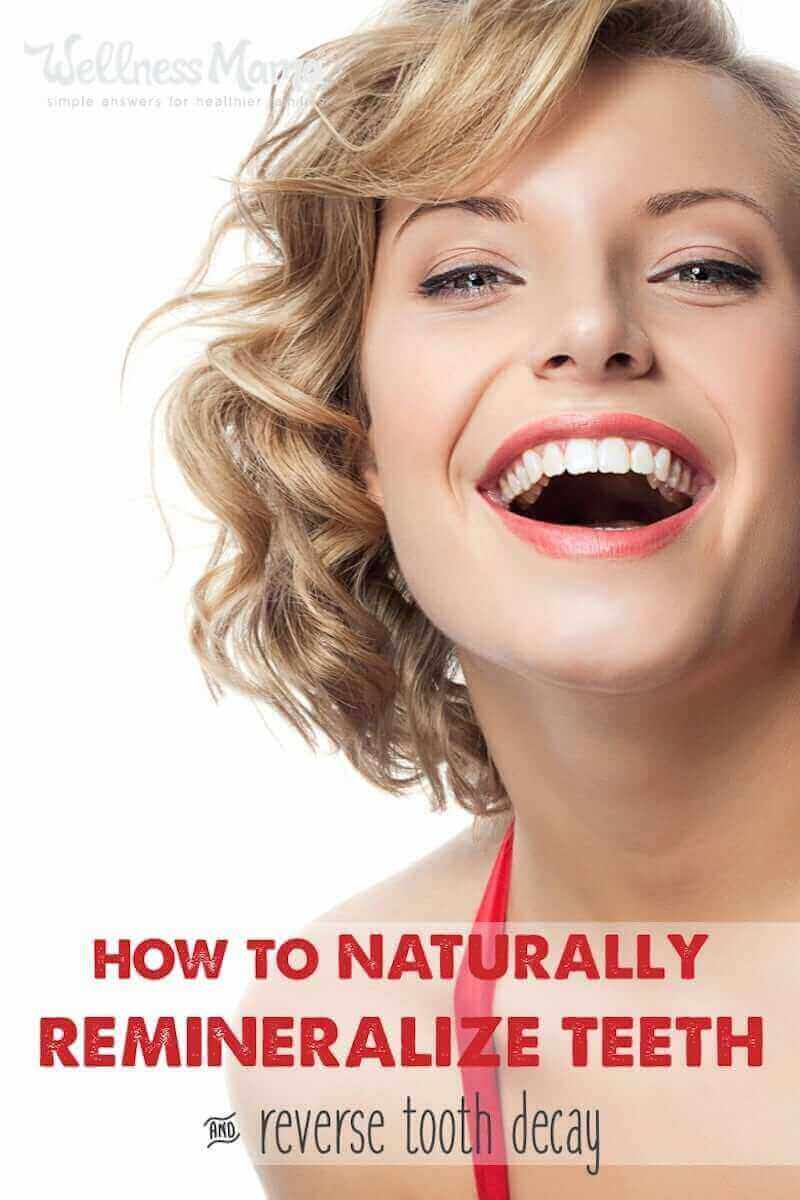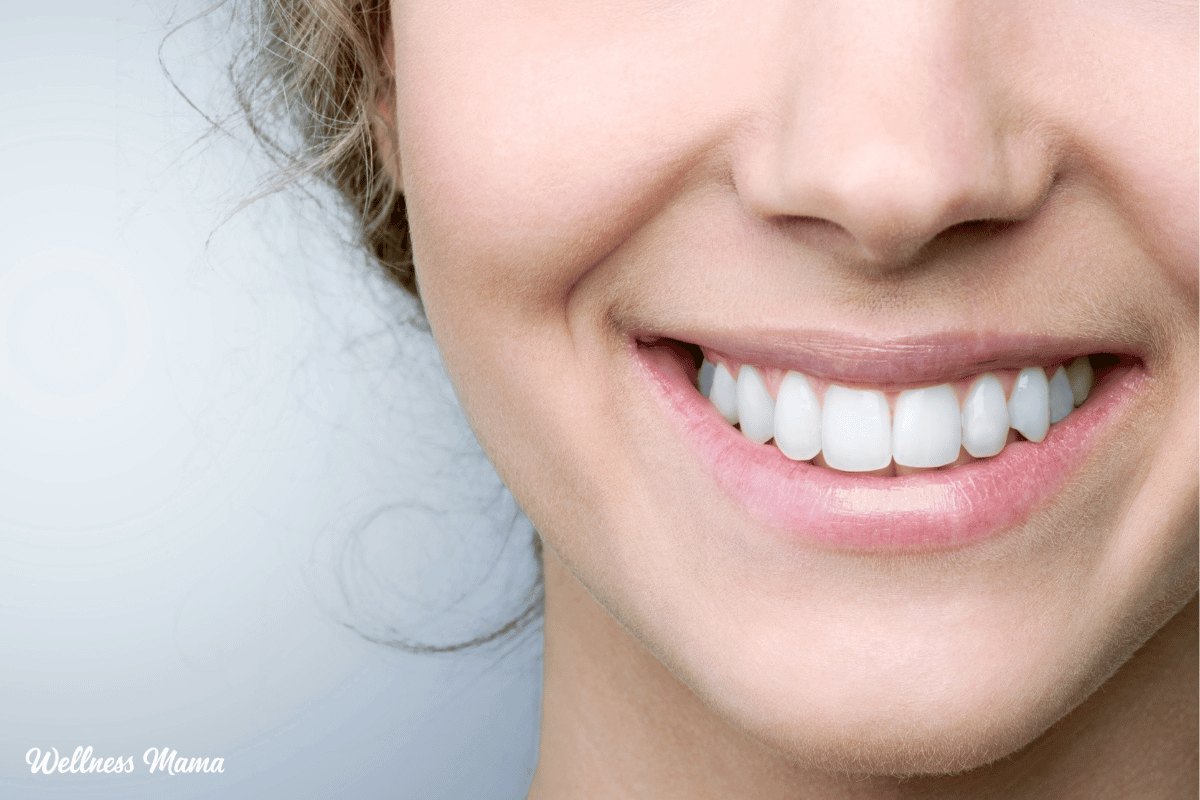If you’re like me, you grew up thinking that improper brushing, sugar consumption, and genetics were the only causes of bad teeth. Cavities and tooth decay meant a person needed to brush better and eat less sugar. And it certainly wasn’t possible to heal or remineralize teeth. Instead, dental fillings or fluoride treatments were the only answer.
I believed all that stuff, too. But, despite all the oral care options we have access to, tooth demineralization is still shockingly high. Nearly 90% of adults and 23% of children have dental caries (or tooth decay) in the US, according to the National Institute of Dental and Craniofacial Research.
After experiencing decay myself, I thought the only way to reverse it was through dental interventions. However, after research and trial and error, I discovered the opposite is true. Diet plays a major role in the health of our mouth, and it’s possible to heal your teeth.
What Is Tooth Remineralization?
When a tooth is demineralized, the minerals have been stripped from it, causing dental caries or decay. Tooth remineralization is essentially its healing process. The body restores minerals in the tooth to help it heal. Calcium and phosphate are redeposited into the decayed tooth. This results in new hydroxyapatite crystals, which strengthen and heal teeth.
Although remineralization can occur, we need the right oral environment. This involves diet and good oral hygiene.
What Really Causes Tooth Decay?
Our bodies are made to heal (that’s their ultimate goal!). Broken bones and damaged tissues can regenerate when properly cared for. It makes sense that our teeth could also regenerate.

Dr. Weston A. Price (a dentist) studied the diet and dental health of cultures with similar genetic backgrounds throughout the world. Some lived in primitive-type societies and ate primitive-type diets. Others ate a more modernized diet.
The image on the left shows a stark example of this: the woman in the top right ate a primitive, whole-food, high-fat diet while the other women ate a more modernized diet.
In his book Nutrition and Physical Degeneration, he shared his findings that many societies have perfect tooth spacing and no evidence of cavities. This is despite having no access to dentists or modern toothpaste. He also found that others with different (more modern) diets had lots of decay.
Sir (Dr.) Edward Mellanby (who discovered vitamin D) and his wife, Dr. May Mellanby, were also influential in discovering the roles of nutrients in oral health. These two contributed much research in the areas of bone and tooth health and mineral absorption. They discovered that tooth structure is determined during a child’s growth and poorly formed teeth are more likely to decay (pretty logical).
Phytic Acid’s Effect on Bone and Tooth Health
Phytic acid is a phosphorous molecule tightly bound with other molecules to form a type of phosphorus. This molecule isn’t easily absorbed by humans. More simply, it’s a compound present in grains, nuts, seeds, and legumes.
The body naturally converts it into phytates, which, according to some research, remove calcium from the body.
People who consume large amounts have higher rates of tooth decay, mineral deficiencies, and osteoporosis. Sadly, most American diets are high in grains, sugars, and vegetable oils and low in animal fats and fat-soluble vitamins. This is the exact opposite of what Drs. Mellanby found to be helpful for optimal tooth health.
Vitamin D and Phytic Acid
Removing phytic acid from the diet and adding minerals and fat-soluble vitamins allows bones to remineralize. Drs. Mellanby wanted to study if this would also occur in decaying teeth.
They studied children with cavities and put them into three groups:
- Group 1 – Regular diet plus oatmeal (high in phytic acid)
- Group 2 – Regular diet plus vitamin D
- Group 3 – Diet low in phytic acid plus vitamin D
They found that the first group continued to get cavities with little to no healing. The second group who received supplemented vitamin D showed some healing, but also got some new cavities. The third group showed very few new cavities and even had many existing cavities heal!
The Doctors’ Conclusion: Diet Affects Oral Health
These doctors all reached the same conclusion after years of research. They found that tooth structure and decay are largely determined by diet, especially three main factors:
- The presence of enough minerals in the diet.
- The presence of enough fat-soluble vitamins (A, D, E, and K) in the diet.
- The bioavailability of these nutrients and how well the body absorbs them. This is largely related to the presence of phytic acid and sugar in the diet.
These doctors showed in their research that teeth can heal themselves through remineralization.
What Helps Remineralize Teeth?
We know teeth can remineralize, but what can you do to correct tooth demineralization? There are several easy steps to take if you want to improve your tooth enamel. Things like eating a balanced diet rich in good fats, vitamins, and minerals. It’s also important to pay special attention to oral hygiene, help heal the tooth surface, and avoid dental interventions.
5 Ways to Remineralize Your Teeth
Improving the health of your teeth is possible if you follow a few simple guidelines for diet and oral hygiene. Not only will these tips help strengthen your teeth but they’ll lead to better overall health in your mouth and body.
1. Foods to Avoid for Healthy Teeth
It’s not possible to fully eliminate phytic acid from the diet. But you can minimize the foods that contain the highest amounts. This includes things like nuts, seeds, grains, and legumes.
Some preparations of foods can reduce it. Soaking and fermenting is one method. For instance, nuts have a high phytic acid content, but soaking them overnight in salt or lemon water and then rinsing and dehydrating them in the oven can greatly reduce it. In addition, cooking legumes in a pressure cooker like an Instant Pot can also reduce it.
Another food to avoid is sugary foods. This includes even natural sugars and starches. Limiting fruit and starchy foods (carbohydrates) like sweet potatoes will help with remineralization. Studies show that the more sugar we eat, the higher the risk of cavities. But it’s not just the amount but also the frequency. So, avoid eating snacks and focus on meals. And stay clear of sugary drinks and fruit juices.
Dentists commonly teach that sugar sitting on the teeth causes cavities, but it’s not so simple. Even if you brush after every meal, you can still get cavities from a high sugar or starch diet. This is because sugar depletes the nutrients we need for healthy teeth, weakening enamel.
2. Foods That Remineralize Teeth
To rebuild tooth enamel, focus on mineral-rich vegetables for their micronutrients. Vegetables with calcium and vitamin D will help the enamel surface.
Homemade bone broths and pasture-raised proteins provide added minerals and vitamins. If you’re short on time, I recommend buying your broth online.
Another excellent food to help with tooth decay is healthy fats. Seafood (including sardines), olive oil, coconut oil, avocados, and other healthy fats support your teeth. In addition, pasture-raised, cultured butter helps increase the presence of fat-soluble vitamins.
3. Supplements to Help Heal Cavities
Sometimes we need to boost our mineral levels with supplements. Unfortunately, many foods are nutrient deficient because the soils are stripped in our modern world. Supplements help fill in the gaps.
I recommend these supplements for dental healing:
- Vitamin D – In the study by Drs. Mellanby, when vitamin D was optimized cavities healed even without diet changes.
- Vitamin K27 – This vitamin helps the body send calcium where it needs to go. It strengthens teeth and bones. I like this one from Just Thrive.
- Probiotics – Our oral microbiome is more important for our oral health than we realize. Having a healthy microbiome promotes healing.
- Collagen – This is the main protein in our bodies and is what our bones, joints, teeth, and skin are made of.
4. Best Toothpaste and Oral Care Products to Remineralize Teeth
Practicing good oral hygiene habits are important in healing your teeth. Brushing twice a day and flossing daily is key to good oral hygiene!
Hydroxyapatite – A hydroxyapatite toothpaste is also vital to the remineralization process. Hydroxyapatite is a mineral that helps strengthen teeth. It’s a key ingredient in my Wellnesse toothpaste. Want to make your own? This homemade remineralizing toothpaste is a great option.
Charcoal Toothpaste – A few times a week, use an activated charcoal toothpaste to pull toxins from the mouth. My Wellnesse Charcoal Toothpaste makes it easy to do! It also has xylitol in it, an alternative to sugar as a sweetener. There’s evidence xylitol helps fight cavities. Avoiding sugar is important in the remineralization process.
Flossing – Another important step to a clean mouth. It helps remove plaque and food particles to promote a clean mouth. Wellnesse’s silk floss also has peppermint oil for its antimicrobial properties.
Oral Rinses – When I was healing my teeth, I made a mouthwash with calcium and magnesium powders (75% calcium, 25% magnesium) dissolved in water daily to help provide minerals. Oil pulling is another great way to support tooth and gum health. I recommend doing it for 5 to 10 minutes a day.
5. Stay Hydrated
It’s important to stay hydrated including when it comes to saliva production. Saliva is important for neutralizing mouth pH levels. Having a neutral to slightly alkaline mouth pH in the mouth leads to stronger enamel and less bacteria, two important pieces in tooth remineralization. In addition, drinking water prevents dry mouth, which also impacts the pH level.
Aim to drink at least half your weight in water each day to help your mouth’s pH level. I add minerals to my water (and salt) to make sure I’m staying hydrated.
How Long Does It Take to Remineralize Teeth?
The remineralization process isn’t something that happens overnight. It can take several months or longer to strengthen your teeth. Following a plan to reduce phytic acid, eat a nutrient dense diet with minerals, and brush with remineralizing toothpaste with hydroxyapatite can help the process work faster.
My Experience With Remineralizing Teeth: Before and After
In early 2010, my regular dental check-up revealed I had some soft spots on my teeth. I also had one “official” cavity. The cavity wasn’t bad, and while they suggested getting it filled soon, it wasn’t a huge rush. They took X-rays, so I have picture evidence of my teeth at this time.
I had every intention of getting it filled quickly, but then life happened and I didn’t get back to the dentist for months. When I was finally ready, I’d read some interesting information about the ability of teeth to heal, so I decided to wait.
I did more research and read Cure Tooth Decay: Heal and Prevent Cavities with Nutrition by Rami Nagel. I also read accounts of people reversing dental damage, so I decided to give it a try. From the research, I created a diet and supplement regimen to try to heal my teeth.
After a couple of months, my teeth were whiter and my tooth sensitivity to cold was much better. This was big news to me as I used to have such sensitive teeth that drinking too cold of a drink could literally almost bring me to tears.
My Results
In the fall of 2011, I finally got around to going back to the dentist (I know, I know… every six months…). I didn’t mention the cavity and soft spots that needed to be fixed… and neither did the dentist!
The hygienist told me that my teeth and gums looked great and asked if I’d started using fluoride or fluoride toothpaste (my chart made it very clear I was anti-fluoride). I told her no but that I had been taking better care of my teeth lately (very true!). When the dentist checked my teeth, he didn’t mention any problem areas either. My teeth had remineralized, and the cavity was no longer there!
Tooth Remineralization Summary
While we’ve been made to think the only way to avoid cavities is to reduce sugar and brush our teeth, the research points to many more dietary causes. And dental interventions aren’t the only answer when it comes to trying to heal decay. Some time and patience, along with great oral hygiene habits and a specific diet, will help heal teeth without the need for fillings!
This article was medically reviewed by Dr. Lauren Jefferis, board certified in Internal Medicine and Pediatrics. As always, this is not personal medical advice and we recommend that you talk with your doctor or work with a doctor at SteadyMD.
This article was medically reviewed by Dr. Steven Lin, who is a Board accredited dentist trained at the University of Sydney. With a background in biomedical science, he is a passionate whole-health advocate, focusing on the link between nutrition and dental health. Listen to my podcast or read the transcript of my interview with him here.
As always, this is not personal medical advice and we recommend that you talk with your doctor or dentist.
Have you tried to remineralize your teeth? Would you try it with your teeth? If you did, what did you do and how did it go?



Leave a Reply